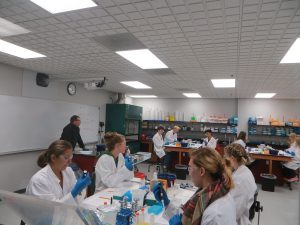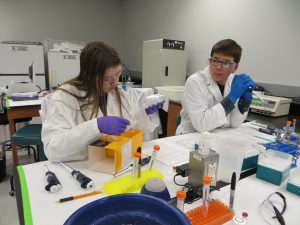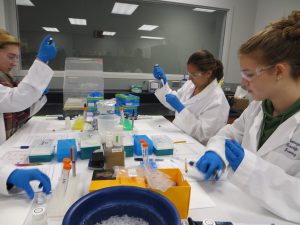
The BTC Institute has many partners in creating educational opportunities in the molecular biosciences. In recent years, we have worked with the Dane County School to Work Consortium (DCSWC) to create a unique, one-semester class aimed at giving high school Juniors and Seniors interested in scientific research and health careers a chance to explore how concepts they have been learning about in their biology and biotechnology classrooms are used in the laboratory.
To take it one step further, these laboratory experiences are tied to the Gates Foundation Grand Challenges in Global Health. The Challenges provide a framework to help students understand worldwide concerns, including ways in which biotechnology can be applied to generate solutions to these problems. Students are encouraged to place scientific challenges within social and socioeconomic contexts which, in turn, make some solutions more appealing than others. This holistic approach provides the “real world” milieu that is so sought after in academic endeavors.
Students begin the semester by studying the Grand Challenges and considering their related personal interests. As they begin to learn techniques for isolating and testing genetic material, they also study why this is important in our global environment—from understanding the basis for the spread of disease, to how these techniques can be modified to be used in even the remotest areas of the world.
 In addition to human genetics, students study plant genes and learn how genetically modified organisms (GMOs) are created and detected. Using role-playing from various perspectives, the values of GMOs and associated concerns regarding their use are considered in detail. The use of genetic modification in food crops is steeped in controversy and understanding different viewpoints is essential in our increasingly global world.
In addition to human genetics, students study plant genes and learn how genetically modified organisms (GMOs) are created and detected. Using role-playing from various perspectives, the values of GMOs and associated concerns regarding their use are considered in detail. The use of genetic modification in food crops is steeped in controversy and understanding different viewpoints is essential in our increasingly global world.
With these experiences as a foundation, students then study proteins, perform purifications and analyses, in particular with antibodies. In the process, they study the immune response and how vaccines are prepared and distributed. The ability to reach remote populations with combinations of vaccines that are at the same time safe and cost effective — as well as trusted by the people receiving them — proves to be a major challenge. The many aspects of this problem are discussed in class. When possible, current events and up-to-the minute discoveries are incorporated into this conversation, illustrating how dynamic the field of biotechnology is, perhaps especially when applied to human health.
 As we move faster and faster in this “information age,” it feels more important than ever to pause for a moment to allow for reflection on the technologies that we are developing and how they can be used in positive ways to improve human health without damaging the environment. This is truly a global effort! Our high school course is but a small contribution that just might begin to influence the next generation, encouraging our students to rise to some of these big challenges—we are grateful for this opportunity and proud of their efforts.
As we move faster and faster in this “information age,” it feels more important than ever to pause for a moment to allow for reflection on the technologies that we are developing and how they can be used in positive ways to improve human health without damaging the environment. This is truly a global effort! Our high school course is but a small contribution that just might begin to influence the next generation, encouraging our students to rise to some of these big challenges—we are grateful for this opportunity and proud of their efforts.

Interesting!
Can you post the curriculum?!
Hi there, We don’t have access to the curriculum at Promega, but you can email any of the staff at the BTC Institute, http://www.btci.org and they will let you know what they are able to share with you. Thanks for your interest.